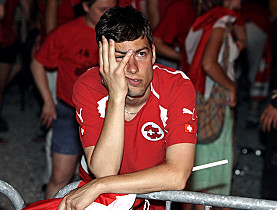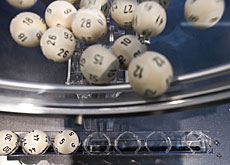“There will be 1,150 fouls in Euro 2008!”

If Switzerland beat Germany in Euro 2008 and the Pope fires the Swiss Guard the following day, a one-franc wager will miraculously turn into SFr1,000.
Yes, the range of weird and wonderful bets available during the 31 games of Euro 2008 means that even if your team is on the wrong end of a 6-0 thrashing, you can still come out smiling.
First things first however: this article is purely academic – swissinfo cannot be held liable for any ridiculous bets on your part, such as backing England – or indeed Switzerland – to win…
So, can the Swiss cause the sporting upset of the century? Well, they can – but they probably won’t.
Back in March, you could get 20-1 on Köbi Kuhn’s boys to be crowned European champions – pay one franc and if they do indeed lift the trophy on June 29 you’ll get back 20 (plus your stake). A week before kick-off however Switzerland’s ongoing injury problems had pushed these odds back to 25-1.
Germany are overall favourites at around 4-1, ahead of Spain, Italy, Portugal and France, all of whom are jostling in the 7-1 area. Co-hosts Austria are rank outsiders at 150-1.
What about Switzerland to simply reach the final? The longest odds you’ll get on this are a ludicrous 9-1 – stay well clear of that bet – with 40-1 for Switzerland to meet Spain or Italy in Vienna (a Switzerland-Germany final is impossible).
You also have to look far down the list of Golden Boot candidates to find a Swiss name: Alex Frei is 66-1 to be crowned the tournament’s top goal scorer. Spain’s Fernando Torres, Portugal’s Cristiano Ronaldo and Germany’s Miroslav Klose are all hovering at around 9-1.
The sad truth is that Switzerland, currently ranked 48th in the world, remain the underdogs, both in their opening match against the Czech Republic on June 7 and to qualify for the quarterfinals.
Spread’em
But to cheer ourselves up, let’s turn to the joys of spread-betting (see box for details).
The internet-induced boom of spread-betting has added another dimension to sports betting, with bookmakers able to offer “spreads”, or estimated ranges of results, on literally anything.
These include the obvious – the total number of goals in a tournament – to the less so, for example how many times the camera will zoom in on Franz Beckenbauer sitting in the stands during a match (one of the more memorable bets from the 2006 World Cup in Germany).
In a nutshell, the bookmakers give a figure for what they think will happen – say the total number of goals scored in a match – and you just have to decide whether more goals will be scored or fewer.
The crucial point is that the “righter” you are, the more money you win – but the “wronger” you are, the more money you lose!
What’s more, the spreads are adjusted every second as the matches unfold, so quick decisions have to be made to maximise your gains – or minimise your losses…
Political consequences?
Here are just a few of the spreads offered by leading British spread-betting company, Sporting Index: over the 31 games of Euro 2008 there will be 74-76 goals (excluding penalty shoot-outs), 15-16 headed goals, 318-325 corners and 1,100-1,140 fouls.
Sporting Index also thinks the fastest goal in a game will be scored after 130-140 seconds, the crossbar will be hit 11-13 times and referees will show 6-7 cards for simulation.
How many games until a player scores a brace (two goals) in a game? Between five and six. We won’t see a hat-trick until 24-26 games but the first own goal will be scored in the middle of the tournament, after 15-16 games.
And could Euro 2008 have political consequences? One German bookie thinks so, offering 150-1 that German Chancellor Angela Merkel resigns following a defeat to Austria. The odds are only 100-1 however of Austrian Chancellor Alfred Gusenbauer walking after a German victory.
Swiss performance
The trick to successful betting is to use your head not your heart – even if that means traitorously betting against your beloved team.
Sporting Index thinks the Swiss will score 4.3-4.7 goals all tournament (excluding extra time and penalty shoot-outs). I don’t know about you, but I think that’s optimistic, especially with only three strikers – and not particularly threatening ones at that – in the squad.
Switzerland’s three group games are against the Czech Republic, Turkey and Portugal. They need to come at least second to qualify for the quarterfinals. I can’t see them scoring against Portugal, they might put one goal past the Czechs but four goals against Turkey looks unlikely. For that reason, I’d sell at 4.3 and hope Switzerland don’t score a single goal!
Of course, my heart hopes I’m completely wrong.
swissinfo, Thomas Stephens
Spread betting is a form of betting in which the “righter” you are, the more money you win – but the “wronger” you are, the more money you lose! It’s you versus the bookmaker, with whom you open up an account.
So, let’s say we’re betting on when the first goal between Switzerland and the Czech Republic will be scored. If the bookmaker thinks it will be between the 41st and 44th minute, it will offer a “spread” of 41-44.
If you think the Swiss – or indeed the Czechs – will storm into the lead well before the 41st minute, you “sell at 41” at say SFr1 a point (you choose your stake). If then someone (anyone!) scores in the 16th minute, you will win your stake multiplied by the difference between the minute the goal is actually scored and the minute at which you sold. In this case 1x(41-16) = SFr25. Easy. But watch out! If no one scores, you will lose 1x(90-41), i.e. SFr49!
If however you think both sides’ strikers are weak and a quick goal is unlikely, you “buy at 44”, i.e. the top of the spread, this time at say SFr5 a point. Then, if no one scores until the 85th minute, you will win 5x(85-44)=SFr205. But if an early goal is scored, you will lose a fair amount – depending on how early the goal is scored.
If the first goal is in fact scored between the 41st and 44th minute, as predicted by the bookie, you get your stake back.
This concept of “buying” or “selling” at the top or bottom of the spread, choosing your stake and crossing your fingers is the basis of all spread betting and is similar to buying and selling on the stock market.

In compliance with the JTI standards
More: SWI swissinfo.ch certified by the Journalism Trust Initiative











You can find an overview of ongoing debates with our journalists here . Please join us!
If you want to start a conversation about a topic raised in this article or want to report factual errors, email us at english@swissinfo.ch.